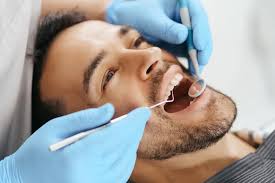
When Is Oral Surgery Necessary? Understanding Common Procedures
Oral surgery can sound intimidating, but it’s often a crucial step in maintaining or improving oral health. Whether it’s removing a troublesome tooth, addressing jaw issues, or restoring your smile, oral surgery helps solve problems that cannot be treated with general dental care alone. But how do you know when surgery is necessary? In this blog, we’ll explore some common oral surgery procedures, their purposes, and how a dental clinic in Dubai can help you decide the best course of action.
What Is Oral Surgery?
Oral surgery refers to any surgical procedure performed on the teeth, gums, jaw, or other oral structures. It typically becomes necessary when a condition is too advanced or complex for traditional dental treatments such as fillings, crowns, or braces. An oral surgeon is a highly trained specialist who performs these procedures to treat a variety of conditions and restore function to the mouth.
When Is Oral Surgery Necessary?
Several scenarios may lead to the need for oral surgery. Let’s take a closer look at some of the most common procedures that might require surgical intervention:
1. Wisdom Tooth Removal
One of the most common reasons for oral surgery is the removal of wisdom teeth. Wisdom teeth, or third molars, often do not have enough space to emerge properly, leading to impaction. Impacted wisdom teeth can cause pain, infection, and even damage to neighboring teeth. If your dentist in a dental clinic in Dubai identifies that your wisdom teeth are impacted, they may recommend surgical removal to prevent further complications.
2. Tooth Extractions
Sometimes, a tooth may be beyond saving due to decay, disease, or injury. In these cases, tooth extraction is necessary to preserve overall oral health. If the tooth is severely damaged or infected, or if it’s positioned in a way that makes it difficult to access with regular dental tools, a surgical extraction may be needed. This procedure is especially common when dealing with teeth that are deeply rooted or broken.
3. Dental Implants
For individuals who have lost teeth, dental implants offer a permanent solution. Implants are small titanium posts surgically placed into the jawbone to serve as artificial tooth roots. Once the bone heals around the implant, a crown is placed on top to restore the function and appearance of the missing tooth. Dental implants are a great option for those who want to avoid the discomfort and maintenance required by dentures or bridges.
4. Corrective Jaw Surgery (Orthognathic Surgery)
Corrective jaw surgery may be necessary for patients who suffer from severe bite problems (malocclusion) or misalignment of the jaw. These issues can cause difficulty with chewing, speaking, and even breathing. Surgery is often the best solution to realign the jaw and improve both function and appearance. If your dentist or orthodontist recommends orthognathic surgery, it’s often because traditional braces or other non-surgical options have not been effective in treating the condition.
5. Cleft Lip and Palate Surgery
For children born with cleft lips or palates, surgery is often necessary to correct the physical deformity and improve speech, eating, and overall quality of life. These procedures are usually performed in stages and may involve a multidisciplinary team of specialists, including oral surgeons, pediatricians, and speech therapists.
6. Treatment of Oral Tumors or Cysts
In some cases, oral tumors or cysts may develop in the mouth, gums, or jawbone. These growths can be benign or malignant, but regardless of their nature, they often require surgical removal to prevent further complications. A dentist may refer you to an oral surgeon if there’s any concern about an unusual lump or growth in your mouth.
Recovery from Oral Surgery
While recovery times and experiences vary depending on the type of surgery, there are some general guidelines that patients can expect:
- Pain Management: Oral surgeons typically prescribe pain medications to manage discomfort after surgery. Most patients experience swelling and bruising, but these symptoms usually subside within a few days.
- Follow-up Care: Post-surgery appointments are crucial to ensure proper healing and detect any complications early.
- Dietary Adjustments: After oral surgery, you may need to stick to a soft food diet for several days or weeks, depending on the nature of the surgery.
Choosing the Right Dental Clinic in Dubai
Selecting a qualified and experienced dental clinic in Dubai is essential to ensure that you receive high-quality care before, during, and after your oral surgery. It’s important to choose a clinic that has certified oral surgeons, state-of-the-art technology, and a compassionate approach to patient care.
At Versailles Dental Clinic, we offer comprehensive oral surgery services tailored to your specific needs. Whether you’re looking for wisdom tooth extraction, dental implants, or any other procedure, our expert team is here to guide you through every step of the process, ensuring that you feel comfortable and well-informed.
Conclusion
Oral surgery can be a vital part of maintaining good oral health and achieving the smile you deserve. While the need for surgery can feel daunting, understanding the common procedures and their purposes can help alleviate some of the anxiety associated with these treatments. If you think oral surgery might be necessary, don’t hesitate to schedule a consultation with a trusted dental clinic in Dubai like Versailles Dental Clinic to discuss your options and take the next steps toward better oral health.
